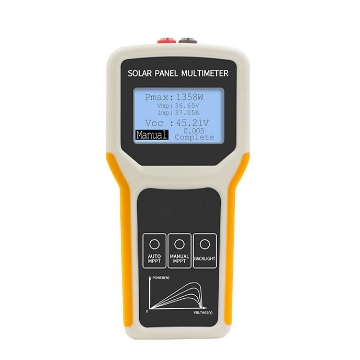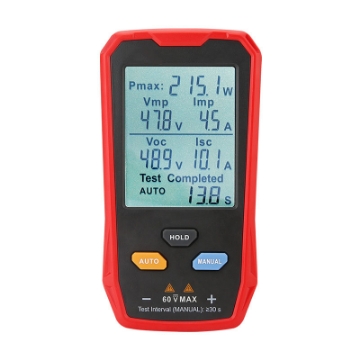Solar Panel Testers
Solar Panel Tester for PV Module Testing
Solar Panel Tester for PV Performance Testing
5-1800W Solar Panel Tester
A solar panel tester is a device used to measure the performance and efficiency of solar panels. It evaluates parameters such as voltage, current, power output, and resistance under different conditions. The goal is to ensure that the panels are functioning correctly and delivering the expected amount of energy.
Key Features of a Solar Panel Tester
- Voltage and Current Measurement: Measures the open-circuit voltage (Voc) and short-circuit current (Isc) of a solar panel.
- Power Output Measurement: Calculates the maximum power point (Pmax) of the panel.
- IV Curve Tracing: Provides an IV (current-voltage) curve, which is critical for diagnosing the health and efficiency of the panel.
- Temperature Compensation: Adjusts the measurements based on temperature, as solar panel performance varies with temperature.
- Data Logging: Records data for analysis over time to track performance degradation or to verify the efficiency claims of manufacturers.
Working Principle of a Solar Panel Tester
Connection to the Solar Panel: The solar panel tester is connected to the output terminals of the solar panel. This connection allows the tester to measure the output voltage (Voc - Open Circuit Voltage) and current (ISC - Short Circuit Current) of the solar panel.
Measurement of Open Circuit Voltage (Voc):
- The tester measures the voltage across the terminals of the solar panel when it is not connected to any load (open circuit condition).
- This voltage represents the maximum potential difference the solar panel can produce under specific sunlight conditions.
Measurement of Short Circuit Current (Isc):
- The tester measures the current flowing through the panel when its terminals are short-circuited.
- This current represents the maximum current output of the solar panel when exposed to sunlight at a given intensity.
Load Application:
- The tester applies a variable load to the solar panel to measure its output at different points.
- By varying the load, the tester records the corresponding voltage and current values to plot the I-V (current-voltage) curve, which helps in determining the Maximum Power Point (MPP) of the panel.
Determination of Maximum Power Point (MPP):
- The point on the I-V curve where the product of current (I) and voltage (V) is maximum is called the Maximum Power Point (MPP).
- The tester calculates this MPP, which is crucial for understanding the efficiency of the solar panel under given conditions.
Calculation of Fill Factor (FF) and Efficiency:
- The fill factor is calculated by comparing the MPP power to the theoretical maximum power (Voc × Isc).
The efficiency of the solar panel is then determined by comparing the MPP to the input solar irradiance (sunlight power per unit area).
Temperature and Irradiance Sensors:
- Some advanced testers have sensors to measure the ambient temperature and sunlight intensity (irradiance) to provide more accurate assessments.
- These measurements help adjust the efficiency calculations according to environmental conditions.
The solar PV tester works by connecting to a solar panel, applying different loads, and measuring various parameters to assess the performance. It provides essential information to determine the health, efficiency, and power output capabilities of the panel under varying conditions.




